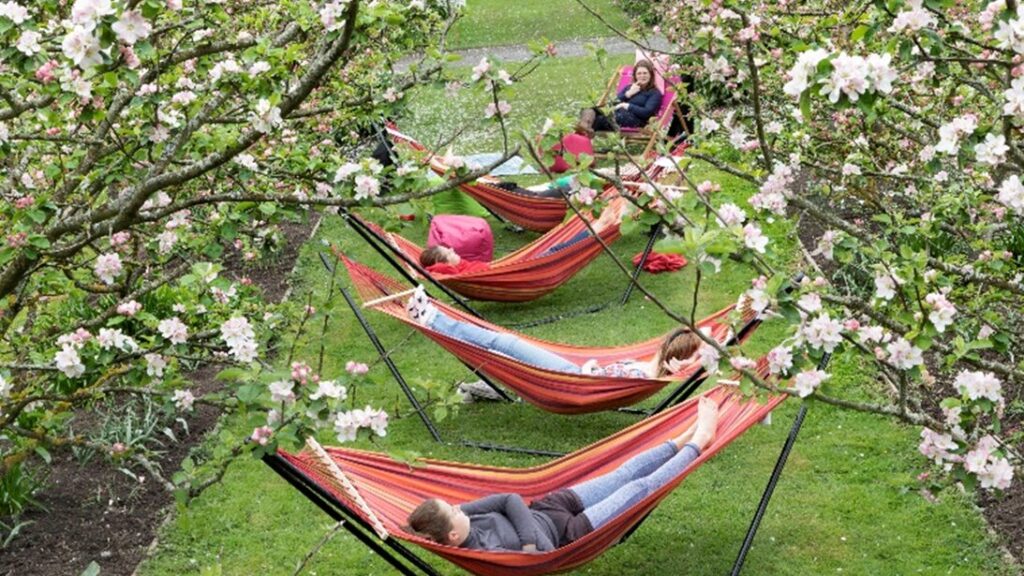Member? Please login
Blossoming connections: Bringing together the National Trust movements in the UK and Japan

Written by BCCJ
March 1, 2024
UK-Japan Relations
With generous support from the Great British Sasakawa Foundation, staff from the National Trust and International National Trusts Organisation are visiting Japan from 25 March to 4 April 2024.
The purpose of the visit is twofold. Firstly, to connect with the heritage and nature conservation sector in Japan. And secondly, to deepen understanding of Hanami, which has inspired the National Trust’s largest annual public engagement campaign.
‘Blossomwatch’ began in 2020 and encouraged people to stop and take time to notice nature. Building on this, the Trust’s Blossom campaign seeks to connect more people to nature through a shared, annual celebration of spring – very like Hanami.
The team are excited to be visiting (hopefully!) at the very height of the Sakura season and would love to connect to people and organisations with an interest in collaboration to protect our built, natural and cultural heritage.
What is the National Trust?
The National Trust is a conservation charity founded in 1895 to preserve places of beauty and historic significance. It now looks after much of the nation’s coastline, historic sites, countryside and green spaces for the benefit of people.
The Trust’s founders pledged to preserve historic and natural places. Their aim was not only to save important sites, but to open them up for everyone to enjoy.
More than 125 years later, protecting and providing equal access to nature, history and beauty remain at the heart of the Trust’s mission.
Thus, alongside the joyful celebration of spring, there is also a plan to increase the number of blossoming trees to benefit people, nature and climate. The Trust has planted blossom circles in 9 cities including London and Birmingham, and started over 50 blossom planting projects at its own sites.
But there is still so much more to do.
Research has shown that 56% of orchards and 50% of hedgerows have been lost since 1900 in England, Wales and Northern Ireland.
The National Trust’s Ambitions
The Trust aims to restore Blossom – this involves planting trees at scale, usually native species, and a public fundraising campaign for doing this work. As part of a commitment to plant and establish 20 million trees across England, Wales and Northern Ireland by 2030, the Trust will plant four million blossoming trees. Just this winter, 43 blossom planting projects have been completed across National Trust sites.
The Trust is bringing Blossom into urban areas – by planting multiple ‘blossom circles’ around the country since 2020. This is in support of work to improve people’s access to nature, often in partnership with local authorities, Historic England and the People’s Postcode Lottery to fund this work.
National Trust to plant blossom trees in cities – BBC News.
The Trust is creating a UK equivalent of Hanami – Blossom has been inspired by (and aspires to be) a UK Hanami. Last year’s National Blossom Week in April was marked with small, community-led events at National Trust places and blossom circles. This year there will be around 815 events at over 100 National Trust places and 11 cities.
The Trust wants to expand this in future and include digital events so that they can be enjoyed nationally. Inspired by the close connection Hanami has to poetry and art, this year a partnership with Simon Armitage, the UK’s poet laureate, has produced Blossomise. This collection of Blossom-inspired poetry will be accompanied by open-source music as well as community events around the country.
The Opportunity
Annie Reilly, Public Engagement & Planning Director, said: “We are still learning as an organisation how to capture the nation’s interest and imagination when it comes to the importance of blossom. Our conservation and research angle reaches some audiences, but bringing the appreciation of blossom outside of a core network of nature lovers poses a challenge. We have run national news and social media campaigns, but we know we need to do more – not just for the future of blossom in the UK but also for the importance it brings to mental wellbeing. We are looking for partners to help us make blossom more experiential – to get people from all walks of life aware of, and interested in viewing, blossom.”
She added: “Ultimately, we want to learn from the things that continue to make Hanami such a relevant part of Japanese (and global) culture today and find innovative and collaborative ways to bring that appreciation to the UK.”
Significance and Impact
Lydia Hunter, Head of Channels, said: “As Europe’s largest conservation charity, and with the land and historic places we look after, we are in a unique position to establish a culture of Hanami-style blossom appreciation in the UK. We don’t want to underplay or ignore how inspired we’ve been by Hanami. Instead, we want to use Blossom to establish deeper cultural connections between our countries, by learning from each other and celebrating blossom together through art, nature, history and beauty.”
She added: “Our 2023 campaign engaged 1.5 million people through physical and digital channels. However, our ambition is to grow Blossom’s engagement every year to create a ‘national moment’ that belongs to the people, not the National Trust.”
The National Trust UK team will be visiting Japan from 25 March to 4 April. They would be delighted to connect with BCCJ members to discuss how we can join forces to build Japan/UK cultural relations in this area and work together to preserve irreplaceable built and natural heritage for future generations in both countries. If you would be interested in speaking with a member of their team during the visit, please email [email protected]







